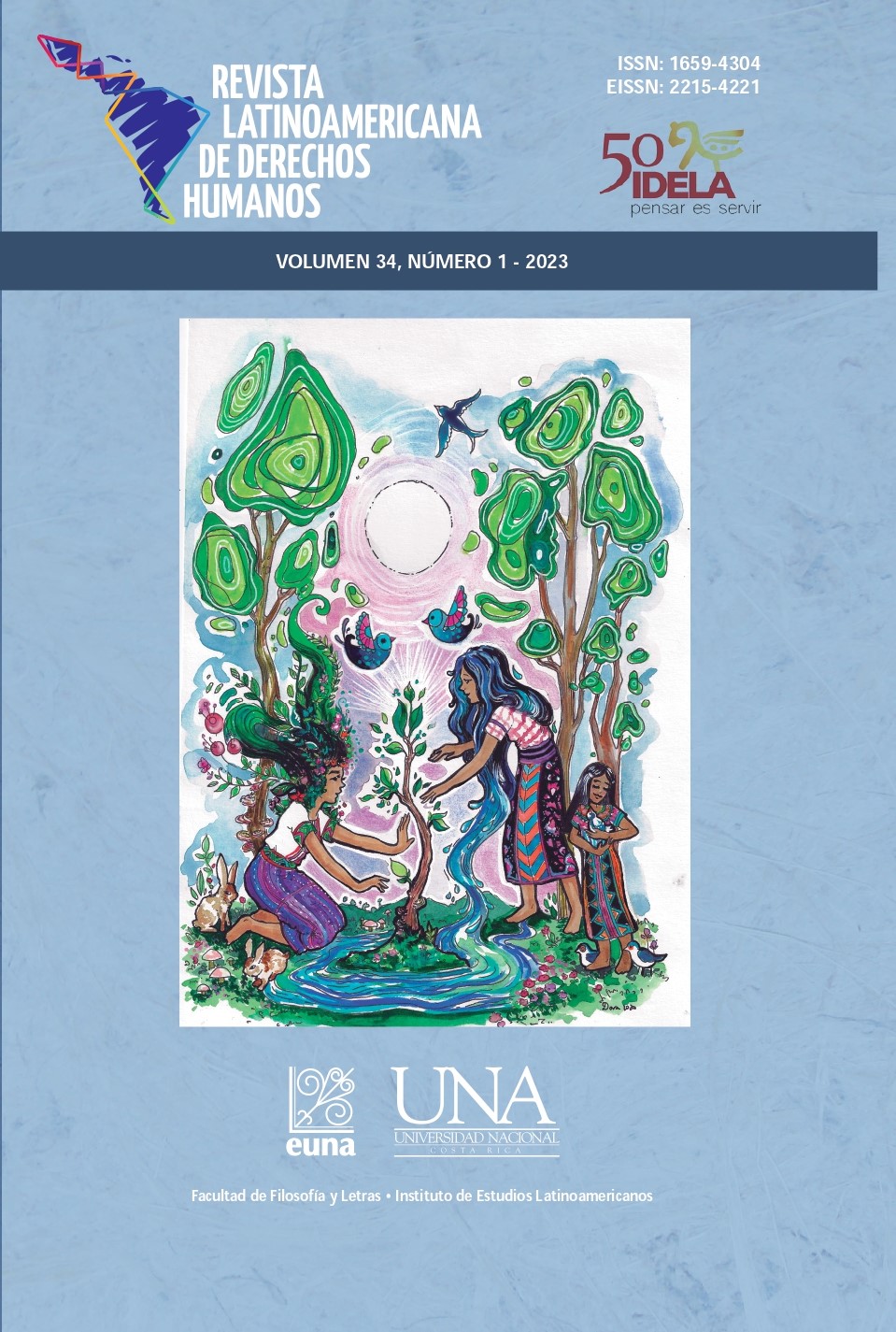The investment of time in the recommendations of serious violations of the National Human Rights Commission
DOI:
https://doi.org/10.15359/rldh.34-1.2Keywords:
NHRC, Mexico, recommendation, serious violationsAbstract
This research article studies the relationship between time investment and bureaucratic restriction, in the issuance of recommendations of serious violations, issued by the National Human Rights Commission (NHRC), in Mexico, from 2000 to 2019. It is explained that the annual administrative closure of the Commission's work influences the duration of the process of issuing the recommendations, which affects the search for prompt justice and the compensation of the victim. In this way, it is suggested that there is arbitrary, intentional and selective detention on certain complaints, by NHRC personnel. For this purpose, recommendations were analyzed for cases that only denounced one serious incident (as defined by article 88 of the internal regulations of the NHRC). The results showed that the administrative criterion influences the publication of a recommendation, and that as November 15 approaches (administrative year closing date), the recommendations are more likely to be published. It is also possible to observe that the recommendations published on dates far from November 15 tend to have a greater probability of not being published quickly. In order to explain this relationship, a multiple linear regression model was used. The duration of time to reach recommendations was used as the dependent variable. To construct the variable, the number of days was counted from the time the complaint was received to the issuance of a recommendatory document. The main independent variable was the “closeness to the end of the period” that indicates the number of days close to the end of each administrative period of the NHRC (every November 15).
References
Brokmann Haro, C. (Septiembre-diciembre de 2018). Seguridad y derechos humanos. La Secretaría de Marina y la CNDH, 2007-2017. Revista del Centro Nacional de Derechos Humanos, 39-62. Recuperado el 1 de noviembre de 2019, de https://www.cndh.org.mx/sites/default/files/documentos/2019-03/2018_DH_34.pdf
CNDH. (2017). Reglamento Interno de la Comisión Nacional de los Derechos Humanos. México.
Diario Oficial de la Federación de México. (11 de noviembre de 1999). Punto de acuerdo de la Cámara de Senadores en sesión celebrada el 11 de noviembre de 1999 https://www.dof.gob.mx/nota_detalle.php?codigo=4956261&fecha=16/11/1999#gsc.tab=0
Diario Oficial de la Federación de México. (9 de noviembre de 2004). Acuerdo por el que se designa al Doctor José Luis Soberanes Fernández para que ocupe el cargo de Presidente de la Comisión Nacional de los Derechos Humanos para un segundo periodo de cinco años, contados a partir del 16 de noviembre de 2004. https://dof.gob.mx/nota_detalle.php?codigo=676355&fecha=09/11/2004#gsc.tab=0
Diario Oficial de la Federación de México. (7 de octubre de 2019). Acuerdo de las Comisiones Unidas de Derechos Humanos y de Justicia del Senado de la República, por el que se emite la Convocatoria para la elección o, en su caso, reelección de la Presidenta o el Presidente de la Comisión Nacional de los Derechos Humanos. https://www.dof.gob.mx/nota_detalle.php?codigo=5574623&fecha=07/10/2019#gsc.tab=0
Diaz Pérez, A. (26 de agosto de 2019). El golpe final a la autonomía de la CNDH. Nexos. Recuperado el 1 de diciembre de 2019, de https://eljuegodelacorte.nexos.com.mx/el-golpe-final-a-la-autonomia-de-la-cndh/comment-page-1
Esteban, M. V., Moral, P. M., Orbe, S., Regulez, M., Zarraga, A., & Zubia, M. (2008). Modelo de Regresión Lineal Múltiple. En M. V. Esteban, P. M. Moral, S. Orbe, M. Regulez, A. Zarraga, & M. Zubia, Analisis de Regresión con Gretl (págs. 52-76). UPV/EHU.
Expansión política. (19 de noviembre de 2019). La CNDH no fue cómplice del gobierno: González; le desea éxito a Piedra Ibarra. Expansión Política. Recuperado el 23 de marzo de 2020, de https://politica.expansion.mx/mexico/2019/11/15/la-cndh-no-fue-complice-del-gobierno-gonzalez-le-desea-exito-a-piedra-ibarra
Human Rights Watch. (2008). La Comisión Nacional de los Derechos Humanos de México. Una evaluación crítica (Vol. 20). https://www.hrw.org/sites/default/files/reports/mexico0208sp_1.pdf
Labarca, M., López Ugalde, A., Sarre, M., & Serrano, S. (2004). Análisis de la gestión de la CNDH 2003. México: ITAM.
Lachenal, C., Martínez Martínez, J. C., & Moguel Valdés, M. (2009). Los Organismos Públicos de Derechos Humanos. Nuevas instituciones, viejas prácticas. México: Fundar, A. C.
Lachenal, C., & Pulido, M. (2013). Un grito en el desierto. Notas sobre el mal uso del lenguaje institucional de la CNDH, a la luz de sus recomendaciones. En J. A. Ibáñez Aguirre, & S. C.
Salcedo González, Ombudsman: asignatura pendiente en México. (págs. 15-38). México: Universidad Iberoamericana.
Larios Díaz, A. G. (2017). La Comisión Nacional de los Derechos Humanos en la Constitución. México: Comisión Nacional de los Derechos Humanos.
Morbiato, C. (2017). Prácticas resistentes en el México de la desaparición forzada. journals.openedition. Recuperado el 31 de marzo de 2020, de https://journals.openedition.org/trace/2446 doi: https://doi.org/10.22134/trace.71.2017.100
Naciones Unidas. (2012). Indicadores de derehos humanos. Guía para la medición y la aplicación . Nueva York y Ginebra: UN.
Ortega Soriano, R. A. (2001). La importancia de la investigación aplicada a los derechos humanos. métodhos, pp. 16-21.
Senado de la República. (7 de noviembre de 2009). Gaceta parlamentaria del Senado de la República. Obtenido de Dictámenes a Discusión y Votación De la Comisión de Derechos Humanos, el que contiene punto de acuerdo por el que se integra la terna de candidatos a la Presidencia de la CNDH: https://www.senado.gob.mx/informacion/gaceta/documento/22876
Uggla, F. (2004). The Ombudsman in Latin America. Journal of Latinoamerican Studies, pp. 423-450. doi:10.1017/S0022216X04007746
Velasco Yáñez, D. (2015). El sistema ombudsman más caro del mundo... ¿y el más ineficiente? Espiral (Guadalajara), 185-220. doi: 10.32870/espiral.v22i63.1670
Downloads
Published
How to Cite
Issue
Section
License
El material que se publica en esta Revista está bajo una licencia “Creative Commons” 3.0 Costa Rica (CC, Reconocimiento-NoComercial-SinObraDerivada 3.0 Costa Rica (CC BY-NC-ND 3.0 CR) . Esto significa que el material publicado en la revista se puede compartir (copiar y distribuir) en cualquier medio o formato considerando que se debe reconocer de forma adecuada la autoría del material y la fuente, no puede utilizarse con fines comerciales y no se aceptan las obras derivadas (remezclar, transformar o crear a partir del material).








